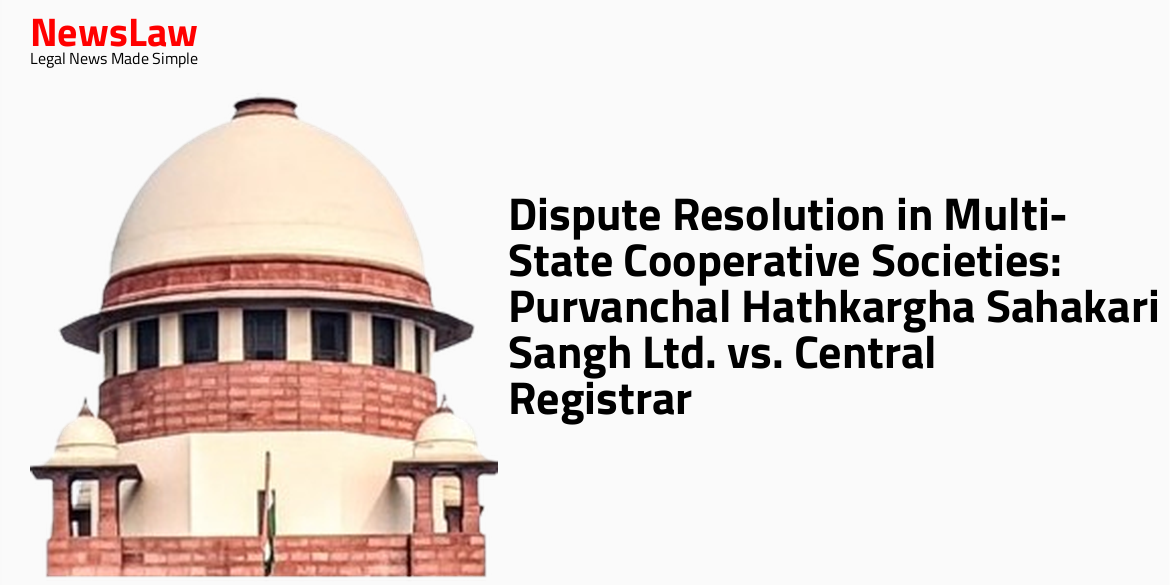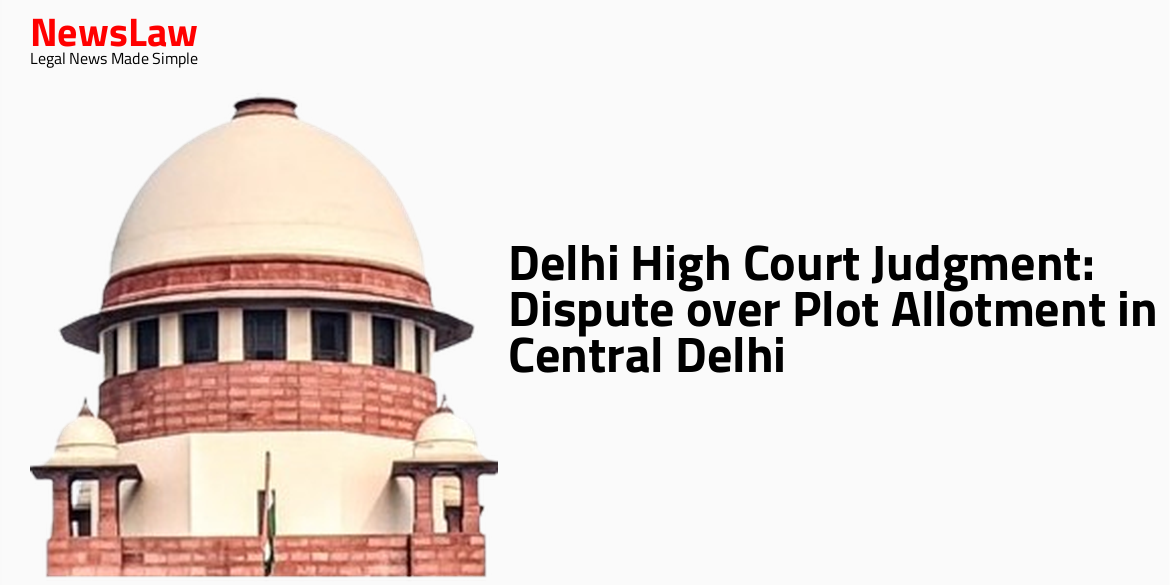Explore a significant legal case involving Purvanchal Hathkargha Sahakari Sangh Ltd. and the Central Registrar concerning dispute resolution in multi-state cooperative societies. The Delhi High Court has issued a judgment addressing the complexities of arbitration and the necessity of following proper procedures under the law. Dive into the details of this case to understand the implications for cooperative societies and the enforcement of legal rights.
Facts
- Petitioner, Purvanchal Hathkargha Sahakari Sangh Ltd., has filed a petition under Section 11(6) of the Arbitration and Conciliation Act, 1996.
- The petition seeks the appointment of an arbitrator in accordance with Section 84 of the Multi-State Cooperative Societies Act, 2002 to settle a dispute with Respondent No.1.
- Despite representations made to Central Registrar (Respondent No.2) on appointing an arbitrator, no progress has been made.
- The Petitioner has been awaiting payments amounting to Rs.1,83,32,731.22/- for supplies made dating back three years.
- The President, Vice President, and favored directors of the Cooperative receive timely payments while the Petitioner’s payments are withheld on trivial grounds.
Arguments
- Notice under Section 21 of the A&C Act is a crucial prerequisite for initiating arbitration.
- The notice raising the dispute was only sent to Respondent No.2 without informing Respondent No.1.
- Failure to provide notice under Section 21 makes the petition liable for dismissal.
- Learned counsel for Petitioner argued that the dispute is arbitrable.
- Compliance with Section 21 is essential for arbitration initiation, as per Respondent’s counsel.
- Section 21 is a vital part of the arbitration procedure that must be followed.
- The arbitrator needs to assess the evidence to determine if the dispute is arbitrable.
- Counsel for Petitioner referred to Section 84(1)(b) of the 2002 Act regarding disputes related to the business of a multi-state co-operative society.
- The current dispute involves the constitution, management, and business of Respondent No.1.
- Arbitration process can start only when a specific dispute is raised by issuance of a notice under Section 21 of the A&C Act.
- The party seeking arbitration has not issued such a notice against the other party.
- Hence, the arbitration process has not formally begun in this case.
Analysis
- The court asserts the necessity of serving a notice under Section 21 of the Arbitration and Conciliation Act for maintainability of the petition.
- The power to appoint an arbitral tribunal is vested in the Central Registrar.
- The dispute in question involves alleged corruption, poor management, and non-payment of dues by the Board of Directors of Original Name.
- The court retains the authority to refer the matter to the Central Registrar for appointment of an Arbitrator if needed.
- The notice requirement under Section 21 of the Arbitration and Conciliation Act is crucial even for initiating proceedings under Section 84 of the 2002 Act.
- Section 84 of the 2002 Act allows for arbitration to settle disputes related to the management, operations, or constitution of a multi-State cooperative society.
- The Central Registrar has the power to appoint an arbitrator in case of a dispute referred to arbitration under this section.
- If the Central Registrar fails to appoint an arbitrator, alternative remedies or processes for appointment need to be considered.
- The Arbitration and Conciliation Act, 1996 applies to all arbitration under this Act, providing guidelines for the arbitration proceedings.
- An Arbitrator is to be appointed by the Central Registrar of Co-operative Societies, Ministry of Cooperation as per Section 84(4) of the Act.
- The available remedy to the petitioner if the Central Registrar fails to appoint an arbitrator has been discussed in previous judgments.
- Service of the notice under Section 21 of the Arbitration and Conciliation Act is a pre-requisite for the commencement of proceedings.
- Provisions of the Arbitration and Conciliation Act, 1996 apply to all arbitrations under the Multi-State Cooperative Societies Act, 2002.
- Notice under Section 21 of the Arbitration and Conciliation Act is essential for initiating proceedings under the Act.
- The Multi-State Cooperative Societies Act, 2002 aims to serve the interests of members and facilitate the functioning of cooperatives.
- Initiating arbitration proceedings for disputes related to multi-state cooperative societies under Section 84 of the Act, following notice to the Central Registrar, is not manifestly illegal.
- In absence of a specific proforma, the petitioner must inform the Central Registrar for appointment of an Arbitrator in case of dispute under Section 84 of the Multi State Cooperative Societies Act, 2002.
- The issue of monetary dues and illegal appointments within the parties is to be resolved by the arbitrator and not by the court.
Decision
- The present petition is allowed and disposed of with certain directions.
- The appointed arbitrator must enter the reference.
- Both parties can seek remedies before the arbitrator as per the law.
- All contentions are left open for further discussion.
- The original party 2 must appoint an arbitrator within three weeks and inform all parties.
Case Title: PURVANCHAL HATHKARGHA SAHAKARI SANGH LTD Vs. ALL INDIA HANDLOOM FABRICS SOCIETY AND ANR (2024:DHC:3781)
Case Number: ARB.P.-75/2024



